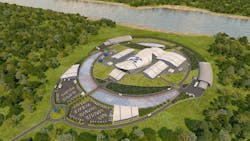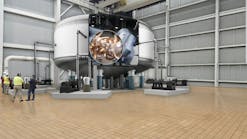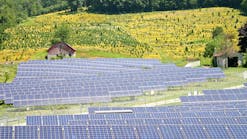NuScale Power and Utah Cooperative Terminate Small Nuclear Carbon Free Power Project
Progress in the small modular nuclear reactor sector suffered a setback this week when SMR project designer NuScale Power Corp. and electric cooperative Utah Associated Municipal Power Systems (UAMPS) announced they are terminating the planned Carbon Free Power Project.
The two partners have worked together for years to advance the prospective small nuclear site in Idaho, but it never got to the construction phase and apparently suffered from a shortfall in subscriptions that would have made deployment economical.
“This decision is very disappointing given the years of pioneering hard work put into the CFPP by UAMPS, CFPP LLC, NuScale, U.S. Department of Energy and the UAMPS member communities that took the leadership role to launch the CFPP,” Utah Association Municipal Power CEO and General Manager Mason Baker said in a statement. “Yet, this decision is the best course for UAMPS members participating in the CFPP, and doing what is best for those member communities will always be the guiding light in such decisions.”
NuScale Power’s SMR design earned U.S. Nuclear Regulatory Commission safety evaluation approval and was certified this year for use in the U.S. Meanwhile, the company progressed into several joint ventures to advance small nuclear technology.
Some see SMRs as a potential carbon-free power generation resource for microgrids at larger sites such as data centers. For its part, NuScale officials noted that the work around the CFPP helped lead the SMR technology forward for future commercial and decarbonization benefits.
“Our work with CFPP over the past 10 years has advanced NuScale technology to the stage of commercial deployment; reaching that milestone is a tremendous success which we will continue to build on with future customers,” NuScale CEO and President John Hopkins said. “NuScale will continue with our other domestic and international customers to bring our American SMR technology to market and grow the U.S. nuclear manufacturing base.”
Among NuScale’s other partnerships announced in recent years include deals with SamSung, Doosan, GS Energy, Dairyland Power Cooperative, as well as energy entities in Estonia and Poland. The company was founded more than 20 years ago through research funded by DOE at Oregon State University, INL and other schools.
The SMRs planned for the Carbon Free Power Project would have included approximately six, 77-MW modules to generate a total of 462 MW of zero-carbon electricity. The conventional U.S. nuclear power plant fleet currently generates close to 19% of the nation’s electricity mix and more than half of its carbon-free power portfolio, according to federal statistics.
The Idaho National Laboratory (INL) was collaborating with NuScale and UAMPS and would have hosted the pilot site on federal land. The CFPP was scheduled to be fully operational by 2027.
Prior to termination of the NuScale flagship project, interest in small nuclear reactors was growing. The INL and microgrid design and operations firm Xendee developed a new model that allows users to compare the economics of adding SMRs to microgrids along with other sources of energy.
The fledgling industry, seen by some as a cost-effective and safer alternative to utility-scale, conventional nuclear plants—such as Georgia Power’s $30+ billion Vogtle 3 and 4 expansion, also has its significant number of detractors highlighting health, location and expense concerns.
In March 2022, the DOE awarded $36 million for 11 projects that aim to limit the waste produced by advanced nuclear reactors, including SMRs. Other companies working in this small reactor space include X-energy, TerraPower and others.
This summer, tech giant Microsoft put out a job posting for position to help the company navigate work around integration of SMRs and microreactors to power data centers which Microsoft Cloud and AI (artificial intelligence) capacity reside on.





